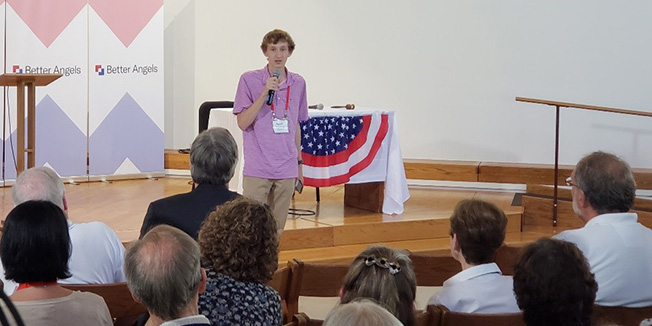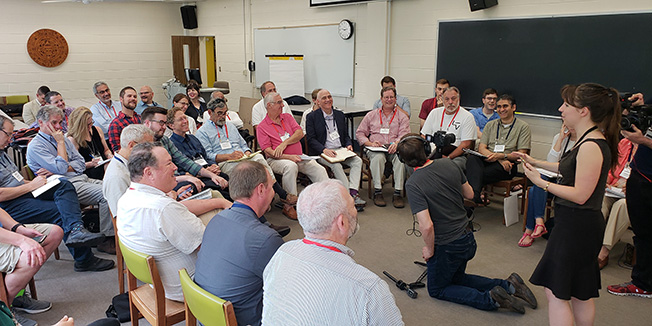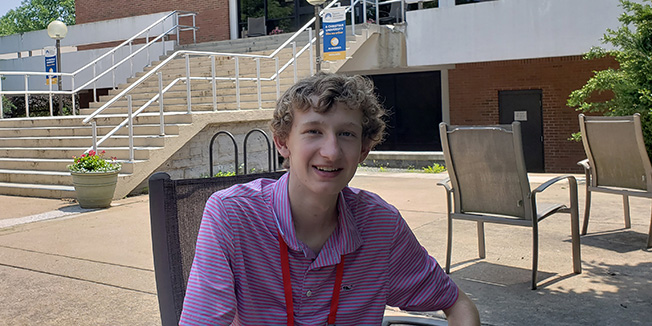Soft-spoken and passionate, Austin Ramsey is a sophomore at East Tennessee State University, majoring in information systems with a minor in business management. He is also active in the ROAN Scholars Leadership. As a freshman, Austin and fellow students forged a ground-breaking collaboration with Better Angels, a national depolarization initiative that brings conservatives and progressives together in civil dialogue and debate. On June 7, I sat down with Austin for a lively conversation before he took the podium to speak at the Better Angels Convention, which was held at Eastern Mennonite University in Harrisonburg, Virginia.

Austin Ramsey addresses delegates at the national Better Angels Convention.
You and a handful of students were the driving force in teaming with Better Angels to launch a remarkable student debate at East Tennessee State University. How did you get it off the ground?
We started in October 2017 when we attended a leadership and ethics conference at Virginia Military Institute. It was called “Speaking Truth to Power,” and we had the opportunity to hear David Blankenhorn speak on “why polarization matters.” I’ve been active in watching and reading the news every day and staying up on local and national politics, and this is a topic I’ve always been interested in.
David gave this very captivating speech and discussion. We got back to campus and I said to my friends, “This is something we need to act upon.” So we emailed David, and next thing you know, we got an email inviting us down to their event in Nashville. We wanted to understand more about their principles and what they are about. We had dinner that night with David and Bill Doherty, another Better Angels founder, and talked and shared where we come from, what we see and what we’d like to do. And from there with a bunch of emails, calls, and collaborations, we continued that conversation and brought it to our campus.
How did you sell the idea to students, faculty, and campus administrators?
When you’re a freshman on a campus, it’s kind of hard to come in and just say, “We want to have this event, and trust us, it’s gonna be great” when you don’t have much validity or credibility. So we were fortunate through our scholarship program to get a little support from them, and also through our faculty advisor, Joy Fulkerson of the Office of Leadership and Civic Engagement. She said, “This is right up my alley.”
“We on campus have this kind of hush-hush environment on the political spectrum, where it’s hard for people to discuss differing viewpoints without getting into an argument that just goes crazy.”
Why were you sold on the idea, and what did you tell her?
I think part of it is that we on campus have this kind of hush-hush environment on the political spectrum, where it’s hard for people to discuss differing viewpoints without getting into an argument that just goes crazy. So I was sold on this from day one, because I felt what David Blankenhorn was talking about, and the other two students with me agreed.
We went to Joy and said, “We’ve connected with this organization, we went to Nashville, we’ve researched ‘em, they’d be a great fit for our campus, and we’d like to have them.” We didn’t say, “Could we?” It was more like, “We would really like to have an event on campus which over the next few months would be planned as part of a civility series.”
Did you encounter any pushback or obstacles?
No, but there were initially some questions about “Why Better Angels? Couldn’t we do this on our own?” The planning was on us, but it was very integral having Better Angels, because they actually came to the campus; David Blankenhorn came, and April Lawson came for the debates, and they just really helped. We couldn’t have done it without them from day one.
April Lawson plays a unique role as a volunteer and board member of Better Angels.
April is phenomenal in conducting debates. Watching her act as the debate Chair was amazing, and we enjoyed talking and working with her. We’re hopefully going to work more with her to map this out across campuses, because we feel like it’s a great way for a campus to invite people of different viewpoints to talk together.

April Lawson gives debate training to Better Angels delegates.
How did you get a larger group of students and others interested in coming to the event?
At the debate itself we had over 50 people—students, faculty and staff, and community—touching the three domains of people we wanted to connect with. That was our vision from day one, connecting to the whole spectrum and not singling out one group. We did it through personal connections; we utilized networks and personal conversation, so instead of just sending out blanket emails, we personally contacted people and said, “Hey, we’d love for you to come to this debate. We’d love for your organization to participate.” And we did traditional channels too, like mass emails to all the organizations; we had University Relations send out a press release, and social media . . .
You had to decide on a single issue for the debate itself. How did you settle on that?
Well, we talked about immigration and a lot of issues . . . but what tied it all together was that this was right around the time of the Parkland shooting. The issue of guns on campus was current and relevant, and we thought it would draw people. We live in a rural county with an urban center—Johnson City is surrounded by farms everywhere. Guns are a part of the heritage of our area and we have a lot of gun owners. So we knew this would really touch people in terms of getting them out there.
I understand the way you framed the issue went through some changes.
Well, we ended up with a hypothetical resolution for people to debate on: “All students should be allowed to carry guns on campus.” But a fascinating tidbit is that our original resolution was “All people should be able to carry guns on campus.”
I connected with one of the local chapter leaders of the NRA and asked if they would be willing to give one of the first speeches, because there are speeches from both sides to start this kind of debate. I shared our original resolution, and she said, “I can’t do that. Even being on the side of pro-guns, I can’t defend the idea of ‘all people.’”
And after she explained it, I understood what she was saying. She said, “‘All people’ could include somebody that’s got a mental illness.” It was eye-opening for us to understand that there are some resolutions that will not work; it’s not a catch-all. To me, that’s the hardest part—finding the issue that’s relevant and prevalent on your campus, and is also split well enough for people to talk about from different sides.
So I called April, and Adam (one of our student co-organizers), and Joy, our faculty staffer. We all got on a conference call at the last minute, and re-crafted it to say, “All students should be allowed to carry guns.” And then the NRA chapter head agreed that she could debate on that.
You ended up with a great turnout and we heard it was a rich debate experience across the board. How did it feel for you?
Since it was the first one on our campus, I was intimidated, very scared, like, “We are just freshmen bringing in this idea, and if it goes wrong, we’re gonna be in the thick of it . . .”
But as I sat there hearing the conversations, I thought, “Wow, this is exactly what I envisioned, and more!” You just had this beautiful—it sounds like poetry, but a beautiful exchange of ideas that were not condescending. Sure, there were times when it got a little bit warm in the room and I could feel some tension, but it self-resolved.
No doubt, the atmosphere was enhanced by the guiding influence of the Chair.
A whole lot of it has to do with the Chair. I have to give April a lot of credit. But she said that the audience did well too, and I agree.
“We had faculty, students, and community members all in the same room talking. To me, that’s marvelous.”
How did it start and build into something special?
We had four prepared speeches, two on the left, and two on the right. People came in with pitchforks ready to knock each other down, like you do in a traditional debate contest. When they gave their prepared speeches, I felt like I was listening to an inaugural address . . . and when they finished, the audience was allowed to join and it became a very nice exchange. People felt like they could talk; nobody felt silenced. We had faculty, students, and community members all in the same room talking. To me, that’s marvelous.
When we asked David Blankenhorn to describe the outcome of the debate, he said it wasn’t so much that people came out with their minds changed one way or another, but they were moved to have more respect, understand each other better, and to honor the process of civil debate and discussion. How did you see the result of this?
I think it follows Better Angels’ idea that we’re not here to change your beliefs, but to help you understand where people come from. That’s what I’ve gathered from day one. I’ve always been a person who tries to listen and be non-judgmental. This just helps me more and more in conversations where I know folks are on another side, to face those confrontations.
And the biggest result from this debate was that I heard the president of the Conservative Coalition and the president of the progressives say, “We need to collaborate more as organizations. We need to come together and talk.” That to me is awesome.
So where do you go from here?
Our goal is to have more debates this fall on campus. We want to connect with local colleges in our area, and maybe to collaborate with organizations like ACTA—to be ambassadors and to help bring this to more campuses, because we have proof of the idea and believe in it.
The college campus is a place for ideas to be exchanged. And I think we’ve seen in certain ways where that has been shunned. This is a way to bring that back and revive what college was founded on: exchanging ideas civilly to help understand where people come from, and to become a healthier nation.

Austin Ramsey, sophomore at East Tennessee State University.
WHO WE ARE
Launched in 1995, we are the only organization that works with alumni, donors, trustees, and education leaders across the United States to support liberal arts education, uphold high academic standards, safeguard the free exchange of ideas on campus, and ensure that the next generation receives an intellectually rich, high-quality college education at an affordable price.
Discover MoreSTAY INFORMED
Sign up to receive updates on the most pressing issues facing our college campuses.